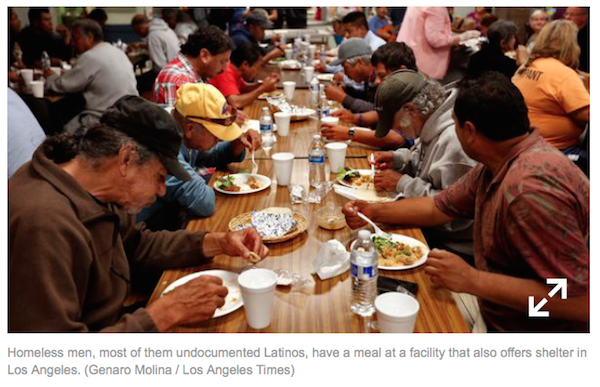
Update: California Is Still America’s Poverty Capital
01/16/2018
It’s not new news that Democrat-run California has the worst poverty in the United States; the Census report to that effect was noted here in 2014.
Still, the fact that the home of Silicon Valley and of so many tech and natural riches can be poverty stricken needs to be repeated, so perhaps people can grasp how stupid liberal governance is. Today’s reminder appeared in the Los Angeles Times on Sunday and is posted below.
Being a rather short item, the op-ed does leave out some vital features, in particular California’s habit of importing foreign poverty via immigration, both legal and illegal. In 2014, Governor Jerry Brown reportedly invited all of Mexico to move north, telling the Mexicans they “are welcome in California.”
Plus there are plenty of magnets for immigrants of all legalities in the state, such as drivers licenses/identification for illegal aliens, taxpayer-subsidized in-state tuition for all residents and financial aid for illegals. And as we saw recently in the trial of Kate Steinle’s killer, a criminal Mexican can get away with murder.
But back to California poverty, one painful symptom is the worsening homelessness, including some of the wealthiest cities, like San Francisco.

Homelessness is exacerbated by immigration also. It was reported in the LA Times June 18, 2017 that Los Angeles homelessness had become diverse: “Recent figures released by the county show that Latino homelessness shot up by 63% in the past year, a staggering number in a county that saw its overall homeless population soar by 23%, despite increasing efforts to get people off the street.”

So poverty is worsened by liberal policies and has many faces.
Op-Ed: Why is liberal California the poverty capital of America?, by Kerry Jackson, Los Angeles Times, January 14, 2018Guess which state has the highest poverty rate in the country? Not Mississippi, New Mexico, or West Virginia, but California, where nearly one out of five residents is poor. That’s according to the Census Bureau’s Supplemental Poverty Measure, which factors in the cost of housing, food, utilities and clothing, and which includes noncash government assistance as a form of income.
Given robust job growth and the prosperity generated by several industries, it’s worth asking why California has fallen behind, especially when the state’s per-capita GDP increased approximately twice as much as the U.S. average over the five years ending in 2016 (12.5%, compared with 6.27%).
It’s not as though California policymakers have neglected to wage war on poverty. Sacramento and local governments have spent massive amounts in the cause. Several state and municipal benefit programs overlap with one another; in some cases, individuals with incomes 200% above the poverty line receive benefits. California state and local governments spent nearly $958 billion from 1992 through 2015 on public welfare programs, including cash-assistance payments, vendor payments and “other public welfare,” according to the Census Bureau. California, with 12% of the American population, is home today to about one in three of the nation’s welfare recipients. [ … ]
Apparently content with futile poverty policies, Sacramento lawmakers can turn their attention to what historian Victor Davis Hanson aptly describes as a fixation on “remaking the world.” The political class wants to build a costly and needless high-speed rail system; talks of secession from a United States presided over by Donald Trump; hired former attorney general Eric H. Holder Jr. to “resist” Trump’s agenda; enacted the first state-level cap-and-trade regime; established California as a “sanctuary state” for illegal immigrants; banned plastic bags, threatening the jobs of thousands of workers involved in their manufacture; and is consumed by its dedication to “California values.” All this only reinforces the rest of America’s perception of an out-of-touch Left Coast, to the disservice of millions of Californians whose values are more traditional, including many of the state’s poor residents.
